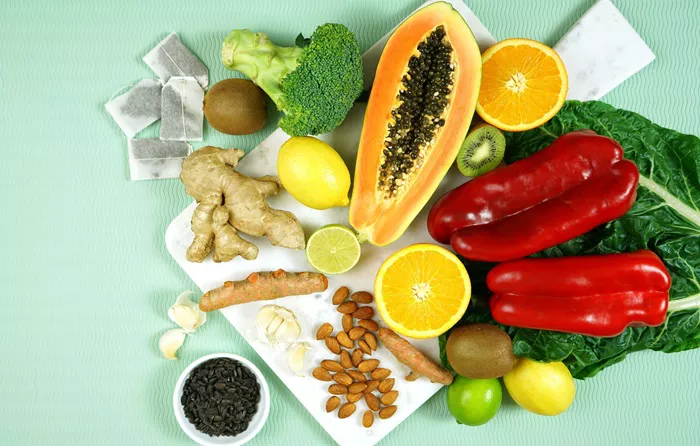In light of her recent bout with COVID-19, my daughter is eager to avoid a repeat experience. She asked me to explore foods that could boost the immune system—and I was happy to oblige.
Health experts agree that a strong immune system is one of the most effective defenses against illnesses like influenza and COVID-19. The foods we consume play a crucial role in strengthening this system.
According to a 2020 article in Nutrition Reviews, several dietary components contribute significantly to enhancing the immune system’s ability to fight infections, such as COVID-19 and the flu. These nutrients often work together to bolster our body’s defenses. Below are some key contenders:
Protein: The Immune System’s Foundation
Protein is vital for our body’s defense system, as antibodies and other immune cells rely on it. To maintain a strong immune response, it’s important to include protein-rich foods like eggs, fish, poultry, meat, dairy, and soy in every meal. Vegetarians can meet their needs with a combination of vegetables, whole grains, legumes, beans, lentils, and nuts.
Vitamin A: Guardian of Skin and Lungs
Vitamin A plays a crucial role in strengthening and regulating one of our body’s most important immune organs—the skin, including the digestive tract and lungs. Foods rich in vitamin A include brightly colored vegetables like sweet potatoes, carrots, kale, spinach, red peppers, as well as apricots and egg yolks.
Vitamin C: The Immune Booster
Vitamin C is a powerful immune enhancer. Since our bodies require it daily, it’s essential to consume foods such as citrus fruits, tomatoes, peppers, broccoli, kiwifruit, and strawberries to meet our needs.
Vitamin D: Protecting Respiratory Health
Research suggests that vitamin D may help prevent respiratory infections, including pneumonia. Besides soaking up a little sunlight, you can find this vitamin in salmon, other dark-fleshed fish, and fortified milk or soy beverages.
Zinc: A Powerhouse Nutrient
Zinc is involved in more than 300 bodily processes that help protect against harmful invaders. Foods like oysters, beef, and fortified breakfast cereals are excellent sources of this essential mineral.
Vitamin E: Partner to Vitamin C
Vitamin E works in tandem with vitamin C to keep cells healthy and resistant to infection. Whole grains, fortified cereals, seeds (especially sunflower seeds), nuts, and vegetable oils are good sources of this nutrient.
Probiotics: Friendly Bacteria
Probiotics, the beneficial bacteria found in cultured foods like yogurt and kefir, and in supplements, help stimulate antibody production. These beneficial bacteria thrive when we eat high-fiber foods such as vegetables, fruits, whole grains, beans, and nuts.
A Balanced Approach
All these nutrients point to the importance of a balanced diet rich in a variety of foods. Maintaining such a diet is crucial for optimal immune function.
Final Thoughts
While diet is key, don’t overlook other protective measures. Make sure you’re up to date on your vaccinations, as viruses can change annually. And remember to wash your hands regularly—keeping germs at bay reduces the strain on your immune system.
Related Topics
Professor Warns of Mental Health Crisis Among Children in Disadvantaged Areas

































